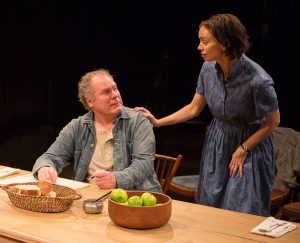A Globe ‘Uncle Vanya’ Worth a Niche in the Chekhov Wing
Everybody in the Old Globe’s Uncle Vanya seems stunned at the growing revelation they have wasted their lives digging the grooves in which they’ll die. The edge of panic gleams through the gloom as they struggle sullenly against the growing tide of bile.
It is the genius of Anton Chekhov to make these petty nobodies and their tedious concerns into such epic representations of humanity that world theatre was changed permanently and audiences a century later can agonize right along with these not-so-distant ancestors.
This backwater provincial estate has been squeezed so long to support the family jewel – a university scholar now sagging into well–deserved obscurity – that the family support system is rattling itself into despair as their jewel is further revealed to be paste.
The old pedant leads the chorus of whiners, complaining endlessly of the ravages of age and the insults of the world’s neglect. His aged mother-in-law is surrendering to senility. His saintly but plain daughter Sonia has been warped by the demands of running the estate into a nun of commerce sunk in a glum collaboration with her Uncle Vanya, whose bitter self-pity at missed freedoms is starting to be scary. Only the local doctor, a noble soul worn raw by the grind of rural medicine, offers a wry distraction, but now he too is trembling in the breeze of fantasy stirred by Elena, the professor’s appealing young second wife.
She was as duped by the illusion of his erudition as the rest of them and now, a disillusioned mess of 27, drifts, in ennui and boredom, even as she casually casts her enchantments. The doctor, smitten despite himself, calls her a beautiful, furry weasel who must feed. Sonia, hopelessly longing after the doctor all these many years, calls her a witch. And Vanya, perilously near to demolishing the whole fragile household, pleading and groveling before her with flowers, blames her mermaid blood.

Left to right, Jesse Pennington, Celeste Arias , Yvonne Woods, Jay O. Sanders and Roberta Maxwell in the Old Globe Theatre’s Uncle Vanya. Jim Cox Photo
At least that’s what he says in the Globe version, yet another new translation of Anton Chekhov’s first big success (1899) commissioned for this engagement from the well-respected team of Richard Pevear and Larissa Volokhonsky plus the director, Richard Nelson.
Translations of Chekhov’s masterpieces abound and inevitably reflect the era of their introduction. It’s fun to lose oneself in dreamy contemplation of compared word choices and subtle rearrangements of sequence. So massive is the influence of the Russian master that even other playwrights often dabble in translation; Jean-Claud van Itallie, Lanford Wilson, Michael Frayne and David Mamet come to mind.
The connubial team of Pevear and Volokhonsky seem to be the present favorites of academia and for now, I must say after this production, with me. I like the drive and the focus of their choices, avoiding slang and contemporary influences but still delivering the passion and heat. I also can understand the collaborative credit for the director of this tense, introspective yet dangerous staging.
The estate manor, sunk into fetid neglect by the weight of dull years, has 26 rooms, but everything seems to happen down in the kitchen. People come and go for meals, snacks, tea or vodka and seem to end up huddled around the big wooden table, muttering in choked conversations far from theatrical artifice. Night and day blend, costumes whisper choices made with indifference.
These effects are not casual but the result of a designer team distinguished enough for any part of the 21st Century American theatre: Jason Ardizzone-West for sets, Susan Hilferty and Mark Koss for costumes and Jennifer Tipton for lighting.
The sound designer, Will Pickens, is the one challenged by Nelson’s inward-folded staging. A thicket of microphones and speakers hangs over the White Theatre stage but the real amenity is the amplified sound available over the individual headphones offered to all patrons free of charge.
(Do not neglect to take one of these. Even if one’s hearing is phenomenal, I suspect the help will be welcomed. And, once sampled, not discarded. Such was the case in my seat.)
The conversational thing is not to be construed as some affected mannerism but instead as an effort to serve the lean power of the translation hot from the source. Those sitting in the front rows may find themselves directly addressed by an actor or even, perhaps, splashed with something. This is a persuasive effort to include us all in the intensely concentrated interior dramas of the characters Chekhov made so shabby yet so unforgettable.
My only complaint is the exclusion of a supporting character, the old tenant Telegin, who brings to the script a welcome whiff of low comedy, a chance for illustrating the complex Russian caste system of the period and (in the script) the occasional seasoning of guitar music. I can imagine the thought that went with the cut but I think it might be worth reconsidering.
The acting ensemble is as praiseworthy as the rest of the project. Jay O. Sanders plays the title role like a mighty beast prodded awake by the lashing of lost alternatives, all but frothing at the mouth in frustration. As the doctor, Jesse Pennington is slumped, weary and distracted by the world he alone seems to see, an early conservationist musing hopelessly over the future of the natural environment while straining to fulfill the duties expected of him by the present. His tensions, as Elena says, make him a handsome and fascinating man who wouldn’t care even if he realized this.
Celeste Arias is a completely plausible Elena, perceptive but ultimately disinterested, restless in bursts, impatient with the deterioration that follows her like a demanding pet. As Sonia, Yvonne Woods hides her sincere compassion behind resolute cheerfulness, pecking birdlike at any seeds of encouragement. Jon DeVries is a tiresome bully and clueless fraud as the faculty failure; Kate Kearney-Patch is a rock of continuity as an old servant; and the fine actress Roberta Maxwell bring an abundance of taste and presence to Vanya’s mother.
In collecting theatre memories, it’s important to be on the watch for definitive productions as well as breakthroughs. No crowns have I to bestow but this Uncle Vanya will henceforth have an important place in my Chekhov Wing.
(Continues in the White Theatre at 7 p.m. Tuesdays and Wednesdays; at 8 p.m. Thursdays-Saturdays; at 2 p.m. Saturdays and Sundays; and at 7 p.m. Sundays through March 11, 2018.)

Welton Jones has been following entertainment and the arts around for years, writing about them. Thirty-five of those years were spent at the UNION-TRIBUNE, the last decade was with SANDIEGO.COM.




I must respectfully disagree with Welton’s statement, “The conversational thing is not to be construed as some affected mannerism.” In truth, he has correctly identified the director’s decision to have his actors speak softly to one another, mumble indistinctly, and ignore the fact that they are presenting a play to an audience. This is more than an affected mannerism: it is a vacuous, obnoxiously precious conceit that undermines the whole purpose of theater, i.e. communication. For example, I was fortunate enough to be sitting close the the front, so I could hear Jesse Pennington, but his speaking was so inarticulate that I could not make out what he was saying half of the time. And the very notion of going to a live theater performance in an intimate venue such as the White Theatre and needing to wear headphones to get the dialogue is demeaning to the public. My only positive reaction to this ill-conceived production is that I had the good fortune to be a guest of a good friend at the performance. Spending even a quartet of my own discretionary funds on this play would have been a sad waste.